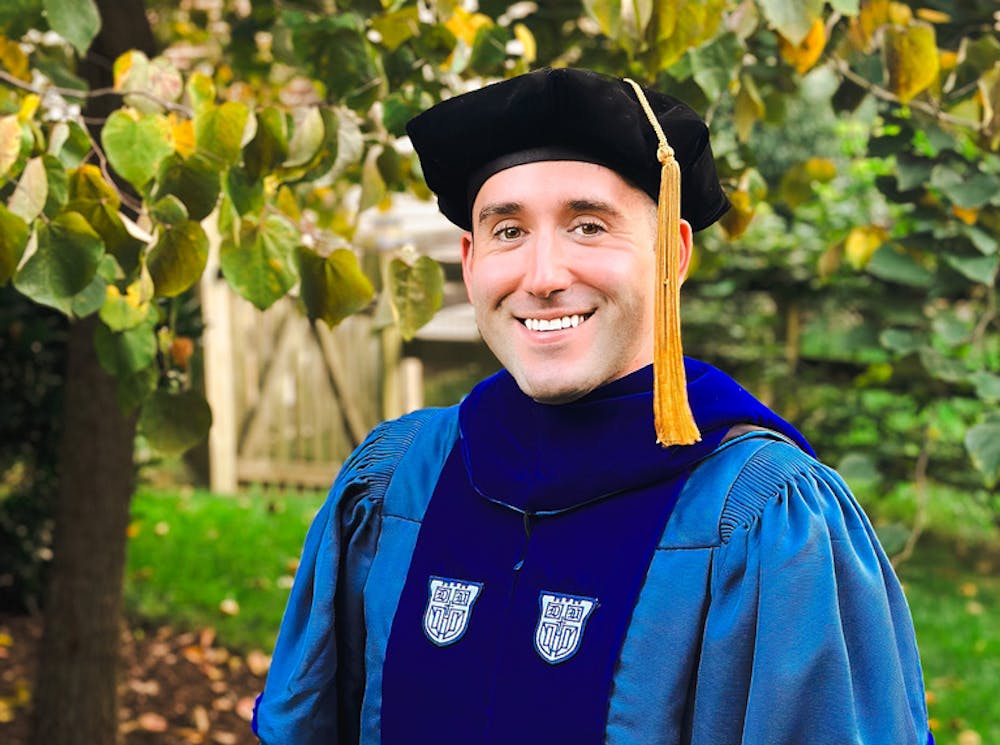Graduate/Professional Young Trustee Finalist Christopher Kilner, Graduate School ‘23, hopes to help the Board of Trustees herald a new century by focusing on climate solutions and innovative technology.
Kilner is currently a research scientist for Bird Conservancy of the Rockies, having recently graduated from Duke with a Ph.D. in ecology.
While at Duke, Kilner served as the chair of the Graduate/Professional Young Trustee nominating committee from 2021 to 2022 and was a member of the committee from 2020 to 2023. He was also a student representative of the Academic Council, as well as the graduate and professional vice president of student affairs.
Originally from Rockville, Maryland, Kilner received his bachelor’s degree from the University of Scranton in 2016 before pursuing a master of science in biodiversity and conservation from Trinity College Dublin as a Mitchell Scholar.
Kilner said his experience as a Mitchell Scholar abroad was a defining one, saying he was thankful to grasp “insights into how difficult decisions” within leadership were made while participating in governmental meetings that aimed to resolve conflict between opposing parties in Northern Ireland.
“I really learned how to sit in a room and listen,” Kilner said. “I think that’s going to be a key attribute, as a member of Duke’s Board of Trustees — to learn from all those with a wealth of knowledge outside of my domain.”
As Duke moves into its second century, Kilner believes the University can make a lasting impact in higher education and the global community.
“My largest responsibility and approach in one word is fiduciary, but what does that really mean?” Kilner said. “The decisions that I make as a member on the Board of Trustees go beyond my own personal beliefs and experiences. Any decision I make on the Board of Trustees is what is healthiest for the future of the institution and those whom Duke impacts.”
One of his key priorities is to target climate change and channel resources toward the Duke Climate Commitment. He believes that Duke can lead the Climate Commitment through the courses it teaches to students, especially given how climate change can affect everything from the economy to global health.
Kilner believes that his experience studying the effects of climate change would be an asset to the board as it navigates environmental issues.
At the University of Scranton, Kilner studied how socioeconomic status and other social variables influence how people confront climate change. In Ireland, he was exposed to the European Union’s climate change regulations and did fieldwork in South Africa, gaining “a different perspective that we often don’t have in the Western world.”
During his graduate years, he worked closely with Assistant Professor of Biology Jean Gibert to study the effects of climate change on protist communities.
“His study of long-term responses to climate change is paradigm-shifting,” Gibert said. “He left an indelible mark as a passionate, altruistic and all-around awesome colleague.”
Kilner believes that the decision to close the herbarium was a great loss for the University and its role in natural science research. While he says the herbarium was an important opportunity for professors and students conducting research, it was also "a nexus point for international researchers, especially from less represented backgrounds, to enter the scientific discourse.”
He hopes that the board will engage in conversations about the herbarium decision moving forward.
Alongside environmental issues, Kilner hopes to address how artificial intelligence and the democratization of computing resources might affect higher education.
“An opportunity for growth is to continue to engage in new fields and new technologies as they emerge while remembering that the core of Duke’s duty to society is to educate the individuals to be the best citizens that they can be,” he said.
Looking ahead, Kilner feels prepared for the finalist meeting in March, as well as for the responsibilities that he would face as a trustee.
“To have this announcement here at Duke is both personally fulfilling and gratifying,” he said. “But more so it is an opportunity for me to continue my desire to be of service to the past, the present and the future at Duke University.”
Get The Chronicle straight to your inbox
Sign up for our weekly newsletter. Cancel at any time.
Winston Qian is a Pratt sophomore and health/science editor for the news department.

